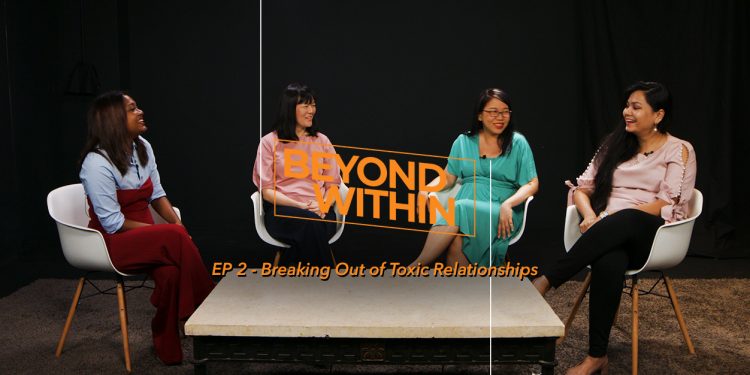The panellists in this episode include clinical psychologist Mahima Gupta, experienced couple and family therapist Evonne Lek, and relationship counsellor and clinical sexologist Dr Martha Tara Lee.
Statistically, eight in 10 people deal with toxic relationships at one point of their lives. These toxic relationships can come in various forms, not just between spouses. If you find yourself or your loved one in a toxic relationship, this episode can provide perspectives on how to recognise these relationships and how to overcome them.
Here are some snippets of what you can expect from this episode:
Defining toxic relationships
Defining a toxic relationship is difficult as it has a vast spectrum to it, from dealing with narcissists to psychopaths.
In this episode, Ms Gupta helps us define a toxic relationship, highlighting that a core element in a toxic relationship is “when you feel like your sense of self is eroding in it”. Mental health issues are also a sign of being in a toxic relationship, which includes anxiety, depression, and panic attacks.
Dr Lee also defined this relationship as “losing your sense of self” and “walking on eggshells”.
Being able to define a toxic relationship is important to recognise it in our lives and allow us to take following steps to move on.
Extremity of sexual abuse
A form of abuse in a toxic relationship is regarding the mindset of having to “give”, especially in the bedroom. Dr Lee describes this form of abuse as constantly “going against what you want and what you have to say is being disregarded, even in the bedroom”.
The Singapore Government announced its intention to repeal ‘marital immunity for rape’ in 2018 and marital rape was finally outlawed from 1 January 2020. Now, spouses in Singapore have the right to say ‘no’ in the bedroom, since under the Criminal Law Reform Act, non-consensual sex is treated as a crime.
Interracial marriages
Like all marriages, miscommunication may occur in interracial marriages. While this is not toxic per se, it is important that these misunderstandings are cleared up, to avoid them leading to an unhealthy pattern in the relationship.
Ms Lek, who is currently in an interracial marriage, explains, “If you work [on your marriage] extensively, you can work through this.”
Without proper communication with your spouse on these issues, it can potentially lead to recurring fights and arguments, making it increasingly harder to tackle such disagreements in the future.
She says that miscommunication can lead to a toxic relationship, and “couples really need to work hard at trying to understand the person and making sure that you’re both on the same page… respecting each other.”
But Ms Gupta notes that since most, if not all, relationships encounter challenges, it does not necessarily mean that they are toxic or abusive.
Over-labelling a relationship
Understanding what a toxic relationship is and is not is important so as to not mislabel a relationship.
According to Ms Gupta, a few ways you can question if you are in a toxic relationship is to ask if you feel supported, seen and heard.
It is important to be careful when using terms such as ‘narcissism’ or ‘OCD’ to label someone, as this might “lead to a block” in the relationship, or people blaming somebody else without taking any responsibility or acknowledging their role in the relationship, says Ms Lek.
Assessing the patterns in your relationship and learning more about your partner can help evolve and deepen your relationship.
The role of upbringing
Upbringing has a major role to play in relationships. Ms Hajji shared her experiences being in an Asian household with ‘tiger parents’, resulting in her feeling controlled on various issues.
While Ms Lek shares that in her practice she has seen an increasing number of adults wanting to heal their relationships with their parents in their 60s and 70s.
Dr Lee explains that many of her clients tend to talk about the past, but “not really acknowledging that they are no longer kids and they can take responsibility to heal themselves.” Even though it might take time, it is possible to reach out, heal and reclaim their own future.
Gaslighting
Gaslighting, a form of psychological abuse, can also be a sign of a toxic relationship. Ms Lek explains the effects of being gaslighted: “You doubt yourself; you think something, you feel something but the other person is telling you ‘no’… You feel that… your sense of self is really eroded.”
Most often than not, the other party may not realise that they are doing this. If you find yourself being gaslit in a marriage and your spouse refuses to go for marriage counselling, Ms Gupta suggests starting off with individual support first.
She explains that individual support can “help [you] get more confidence, feel more sure about [yourself] again, and then approach the relationship in a different way.”
Watch the second episode of Beyond Within to learn more about toxic relationships, how to recognise one and how to move on from them.
[READ AND WATCH: The first episode of Beyond Within to learn how four courageous women were able to overcome their struggles in psychologically abusive marriages.]
If you are in a toxic relationship and would like to seek emotional or mental support, please do not hesitate to call the following helplines in Singapore:
PAVE: 6555-0390
Samaritans of Singapore: 1800-221-4444
ComCare: 1800-222-0000
Mental Health Helpine: 6389-2222
AWARE: 1800-777-5555
MSF Child Protective Service: 1800-777-0000
Pregnancy Crisis & Support: 6339-9770
The Seniors Helpline: 1800-555-5555
Join the conversations on TheHomeGround Asia’s Facebook and Instagram, and get the latest updates via Telegram.














